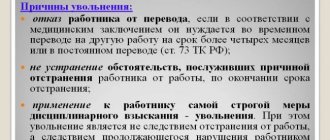From the article you will learn:
If a serviceman becomes ill, he may be discharged from the army. In circumstances where a serviceman is dismissed for health reasons, it is necessary to consider in detail how the dismissal procedure takes place, what the dismissed person is entitled to and what the legislation says about this.
The list of diseases that prevent further service is very extensive. These include diseases of the nervous system and mental disorders, neoplasms and visual impairment, infections and excess weight.
All these diseases have one determining factor: the disease entails a risk to the life of a serviceman and makes it impossible to further perform his duties without harm to health.
In more detail, this type of disease includes:
- HIV, syphilis, tuberculosis, mycoses and other genitourinary diseases;
- neoplasms – malignant and benign;
- blood diseases and circulatory disorders – anemia, hemophilia;
- diabetes and obesity;
- respiratory diseases;
- infectious diseases;
- digestive diseases and metabolic disorders in the body;
- visual impairment – strabismus, glaucoma, blindness;
- hearing diseases;
- personality disorders;
- encephalitis, meningitis, paralysis, Parkinson's disease;
- period of pregnancy, childbirth and the postpartum period;
- exposure to external factors leading to poisoning, injury, etc.
Please note that if the disease has worsened due to alcoholism or drug addiction, military benefits are not retained by the serviceman upon dismissal.
Such diseases must be documented by doctors. The diagnosis occurs at the stage of undergoing a medical examination, then the serviceman is sent to undergo the military military examination and receives a category.
The Regulations on Military Medical Examination (MME), which was approved by Government Decree No. 565, provides an exhaustive list of diseases.
A commission based on health conditions can be based on the results of the fitness category obtained. Thus, category B means limited suitability for military service under a contract, starting from conscripts and ending with those who have the rank of sergeant major, and category D means unsuitability for military service.
The legislation also defines other categories of suitability, where:
- A - means suitability for military service in any army;
- B – certain conditions are required for service;
- D – performance of duties is not allowed for a certain period of time.
A serviceman with category A cannot retire early for health reasons.
Drawing up a report
This document is of utmost importance in a situation where a serviceman leaves military service. That is why the report must be drawn up legally correctly. You should report your dismissal to your immediate superior in any form. This can be done after the military personnel have passed the Military Military Commission and received a category. In order to correctly draw up a report, it should indicate:
- data of the retiring and HF commander;
- the grounds that served as the reason for dismissal, namely the conclusion of the IHC indicating a specific disease or existing injury;
- data on family composition;
- living conditions – availability of residential premises for living;
- information about the family’s place of residence at the current time;
- consent or disagreement to dismissal before provision;
- date of the report and personal signature.
You can download a report on the dismissal of a serviceman for health reasons on our website below.
Download a sample report on dismissal from the RF Armed Forces for health reasons
In addition to the report, you must attach a medical report with a diagnosis and a copy of the rental agreement for office housing.
If a contract is terminated early, the unit commander must have a conversation with the person being dismissed. What information must the official provide:
- information about the timing of dismissal;
- provided benefits in the event that a serviceman goes into the reserve or retires;
- information about the department of the military registration and enlistment office in which the reservist will be registered;
- request from the dismissed person information about the actual place of residence after dismissal;
- find out the presence or absence of additional requests from the serviceman.
The conversation must be documented on a special sheet. This document is attached to the serviceman’s personal file.
Download the form for a conversation with a discharged serviceman
Features of dismissal from military service for health reasons
According to Art. 51 Federal Law of March 28, 1998 No. 53-FZ “On Military Duty...”, you can resign from military service under a contract if the military medical commission (hereinafter referred to as the MMC) recognizes you:
- completely unfit for service (cat. D);
- limited fit (cat. B).
You can retire with category B from a military position if you have the rank of up to sergeant major or up to and including chief sergeant major. Dismissal is also possible if you are serving under conscription.
You cannot be fired without your knowledge. The command must receive the conclusion of the Military Military Commission, but in some cases they can simply demote the rank and transfer to another position in accordance with the state of health, rather than terminating the contract. It all depends on the fitness category.
Categories of suitability for military service
There are several categories of fitness, but only for some of them further military service is impossible:
- cat. A – suitable without restrictions.
- cat. B - suitable with some restrictions on the types of troops.
- cat. B – limited use. They are enlisted in the reserves and may be called up for military training.
- cat. G – temporarily unusable. Sick leave is given if necessary, and re-examination is carried out after six months.
- cat. D – unfit for military service.
If everything is clear with category A - it is assigned in the absence of health problems - then with category B and D it is not so simple: their commission determines if there are serious violations for which further service is impossible.
List of diseases
The list of diseases for which different fitness categories are established was approved by Decree of the Government of the Russian Federation dated July 4, 2013 No. 565 “On approval of the Regulations...”. This is what the IHC is guided by when conducting an examination.
What's included in this list:
| Type of diseases | Name | Categories |
| Infectious and parasitic | Intestinal infections, bacterial diseases; viral and other diseases caused by chlamydia | Untreatable or difficult to treat – C, temporary disorders after exacerbation of chronic diseases – D |
| Neoplasms | Malignant tumors | E. If the disease is temporary after radiation or chemotherapy - D |
| Diseases of the blood and blood-forming organs | Rapidly progressing or slowly progressing with significant impairment of function | D |
| Slowly progressive with rare exacerbations or moderate impairment of function | IN | |
| Metabolic disorders, eating disorders, endocrine diseases | Euthyroid goiter | Causing disorder of other organs – B or D |
| Diseases with significant impairment of function | D | |
| Mental disorders | Severely persistent mental disorders | D |
| Schizophrenia, affective disorders | D | |
| Nervous system diseases | Epilepsy with a frequency of attacks 5 or more times a year | D |
| Single epileptic seizure - once every 5 years | IN | |
| Inflammatory and other diseases with significant impairment of function | D | |
| With moderate or minor impairment of function | IN | |
| Eye diseases | Marked anatomical changes in the position of the eyelids, conjunctiva or orbit with significant impairment of motor functions in both eyes | D |
| Same thing on one eye | IN | |
| Minor anatomical changes | B | |
| Progressive decline in visual function | D | |
| Retinal detachment in both eyes | D | |
| Advanced glaucoma in both eyes | D | |
| Glaucoma in one eye | IN | |
| Motor paralysis of the eyeball | IN | |
| Myopia or farsightedness more than 12 diopters | D | |
| Farsightedness or myopia 8-12 diopters | IN |
The list of diseases also includes diseases of the ears, respiratory organs, circulatory system, digestion, skin and subcutaneous tissue, genitourinary diseases; consequences of injuries and poisoning.
https://youtu.be/XUKx_M9DtF4
Payments and compensation upon dismissal
Upon dismissal for health reasons, military personnel are entitled to a one-time payment, which includes:
- one-time benefit;
- compensation for loss of health.
Work experience is the determining factor in calculating the lump sum benefit. If a serviceman has served for 20 years or more, then the payment amount will be from 7 to 15 salaries, in other cases, when the length of service is less than the specified period, the dismissed person will be paid from 2 to 5 salaries.
Important! If a citizen was dismissed without pension accruals, then he will continue to receive his salary throughout the calendar year.
In addition, upon retirement, a serviceman is entitled to:
- payment of salary for the last month of service;
- compensation for property;
- bonus payment;
- compensation for unused vacation days.
If a serviceman has alimony obligations, their transfer will be made from the full amount of money paid upon dismissal.
What are the reasons for refusing payments?
Every soldier must remember that not in all cases of dismissal he will receive unconditional compensation payments and benefits. They do not apply to military personnel if:
- They were deprived of military rank and rank;
- There were violations of contract terms;
- A sentence of imprisonment was imposed by court order;
- Whether the crime was committed intentionally or not;
- Access to military secrets was denied;
- Transferred to serve in the security forces under the Ministry of Internal Affairs;
- Lost the trust of the administration and colleagues.
If a serviceman is given a refusal to assign and pay due social and other compensatory preferences, he has the right to appeal such a decision in court.
Who is entitled to a pension?
The size of the pension will depend on the disability group that was assigned to the military personnel with a certain type of disease:
- for 1 group its size is 14 thousand rubles;
- for group 2 – 7 thousand rubles;
- for group 3 – 2 thousand rubles.
The size of the pension payment is affected by the presence of an increased regional coefficient. Then the pension amount will differ significantly.
If the serviceman has not been assigned a disability group, then the monthly payment will be established upon reaching a certain age or with a minimum total length of service.
The law includes the following necessary conditions:
- reaching 45 years of age and 20 years of total military service;
- reaching 45 years of age and 25 years of total work experience (in this case, the minimum length of military service must be 12 years 6 months).
If an officer has served less than 10 years, he has the right to apply for preferential terms for a mortgage.
Category of persons with military rank
The state provides each civilian with a package of social preferential rights. For fellow citizens in military service, whose lives are daily exposed to an increased risk of injury, the law also provides for a list of support measures in the event of injuries that are identified by the military medical commission (military medical commission). They are provided with material payments of a one-time nature and in the form of a monthly supplement.
Social and material assistance is provided to the following groups of persons:
- Those who were in contract service and have awards and insignia of the USSR and the Russian Federation;
- Those who served by conscription;
- Military orphans;
- Dismissed for any reason into the reserve, of any branch of military structures.
The above groups include cadets of educational institutions, soldiers, sailors, officers, midshipmen, and warrant officers.
With the transition to a normal way of life, citizens retain the rights enshrined in the Constitution of the Russian Federation: to life, free movement, education, conscientious work, and receiving remuneration for performing work duties. Legal and social support measures are also applied to former military personnel and members of their families. State federal and regional structures are obliged to provide all possible support to citizens who have resigned from the ranks of the Russian army.
Where to go
All military personnel are required to periodically undergo a complete medical examination.
A medical examination is carried out in the following cases:
- before signing a contract;
- at regular examination to confirm satisfactory health;
- when complaining about a disease;
- upon receipt of injuries and injuries;
- in case of a sharp deterioration in the health of a serviceman against the background of the development of a chronic disease.
If deviations are detected, the fighter is sent for inpatient treatment to a hospital.
After undergoing treatment, a medical commission evaluates the condition of the officer or soldier and issues a conclusion on his fitness for military duties.
Legislative basis
Legal regulation in the field of military service is carried out through the following regulations:
- Federal Law “On Military Duty and Military Service” (reflects the procedure for admission, passage and discharge from the army).
- Federal Law “On the Status of Military Personnel” (establishes the rights to use social benefits and the amount of a one-time benefit).
- Federal Law “On monetary allowances for military personnel and provision of individual payments to them” (determines payments to those resigning due to illness).
- Decrees of the President of the Russian Federation (on the right to receive housing certificates, on the choice of grounds for termination of a contract by the military).
If a serviceman dies as a result of injuries received or due to deterioration of health caused by professional activity, the state guarantees social benefits and pays benefits to his family.
○ Medical insurance
All military personnel are subject to mandatory medical insurance at the expense of the state. This requirement is enshrined in Federal Law No. 52 “On Compulsory Insurance of Military Personnel.” The insured event covers:
- Death during military service or contract, as well as during military training. The amount of monetary compensation, that is, the insurance premium that the relatives of the deceased receive, is two million rubles .
- The death of a military personnel within one year after the end of service, if the death was the result of an injury, injury or disease received during service. The insurance amount is also two million rubles .
- Assignment of group 1 disability that occurred during the period of service under a contract or conscription. This insured event is compensated by insurance in the amount of one and a half million .
- Receiving the first, second and third groups of disability within a year after dismissal, if this is caused by physical damage or illnesses received during military service, is recognized as an insured event. Payments are 1'000'500, 1'000'000 and 500'000 rubles respectively .
- Serious injuries, fractures, concussions, contusions or wounds are grounds for obtaining insurance in the amount of 200,000 rubles .
- Minor injuries, if they caused a commission, are subject to insurance compensation in the amount of 50,000 rubles .
○ What additional Does a discharged military man have rights?
In 2006, the Constitutional Court adopted decision No. 187, which provided for the need to ensure the implementation of social rights of military pensioners working under an employment contract, which would guarantee them, in addition to military pension payments, the opportunity to receive the insurance part of their labor pension, taking into account the insurance contributions reflected on their individual personal accounts in the Pension Fund.
This conclusion of the country's highest judicial body led to the necessary changes that were made to certain legislative acts of the Russian Federation on pension issues.
Therefore, at present, military personnel (with the exception of soldiers, sailors, as well as non-commissioned officers of conscript service), upon reaching the generally established retirement age and having at least five years of insurance experience, simultaneously receive a long service pension and a labor pension according to old age.










